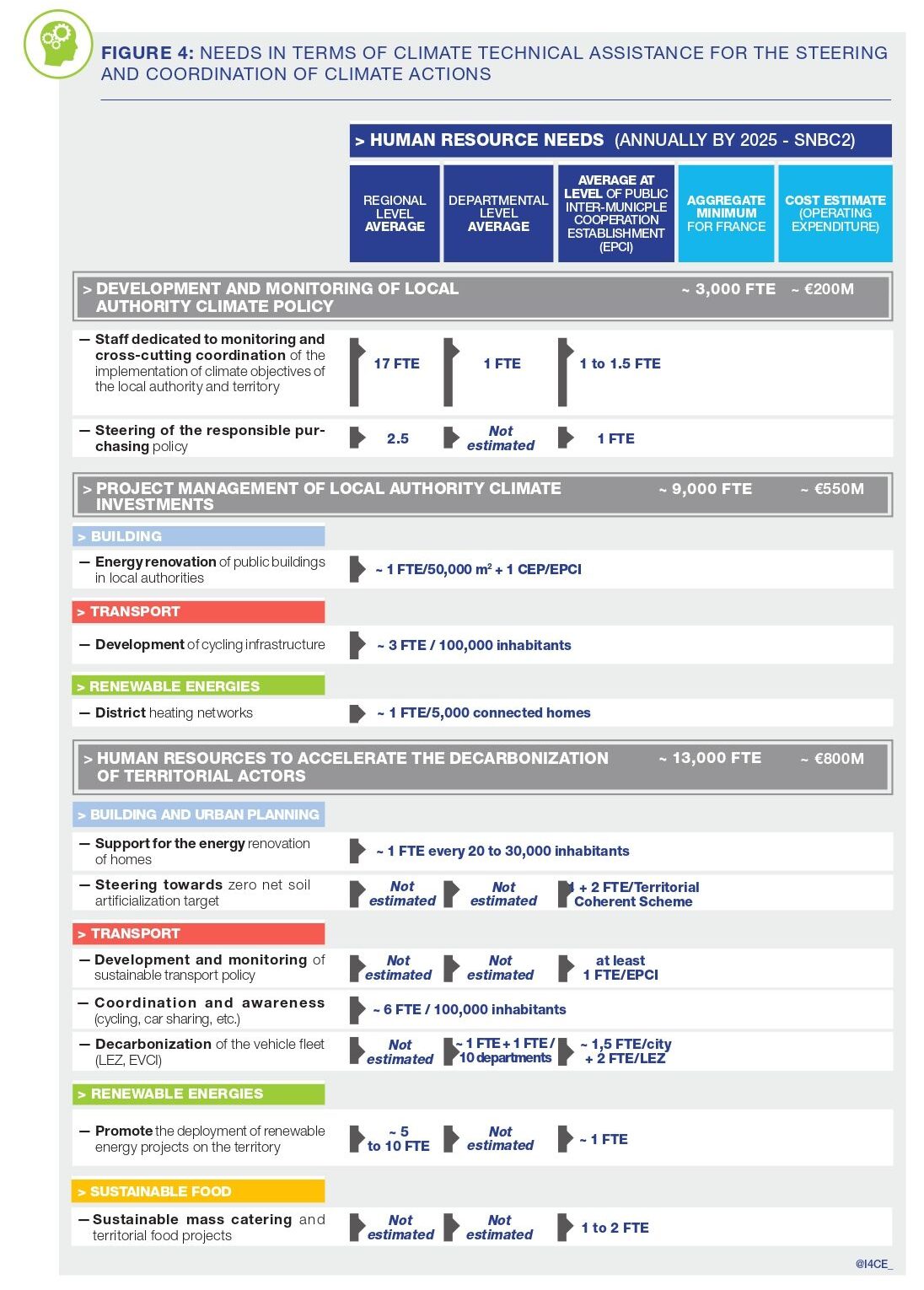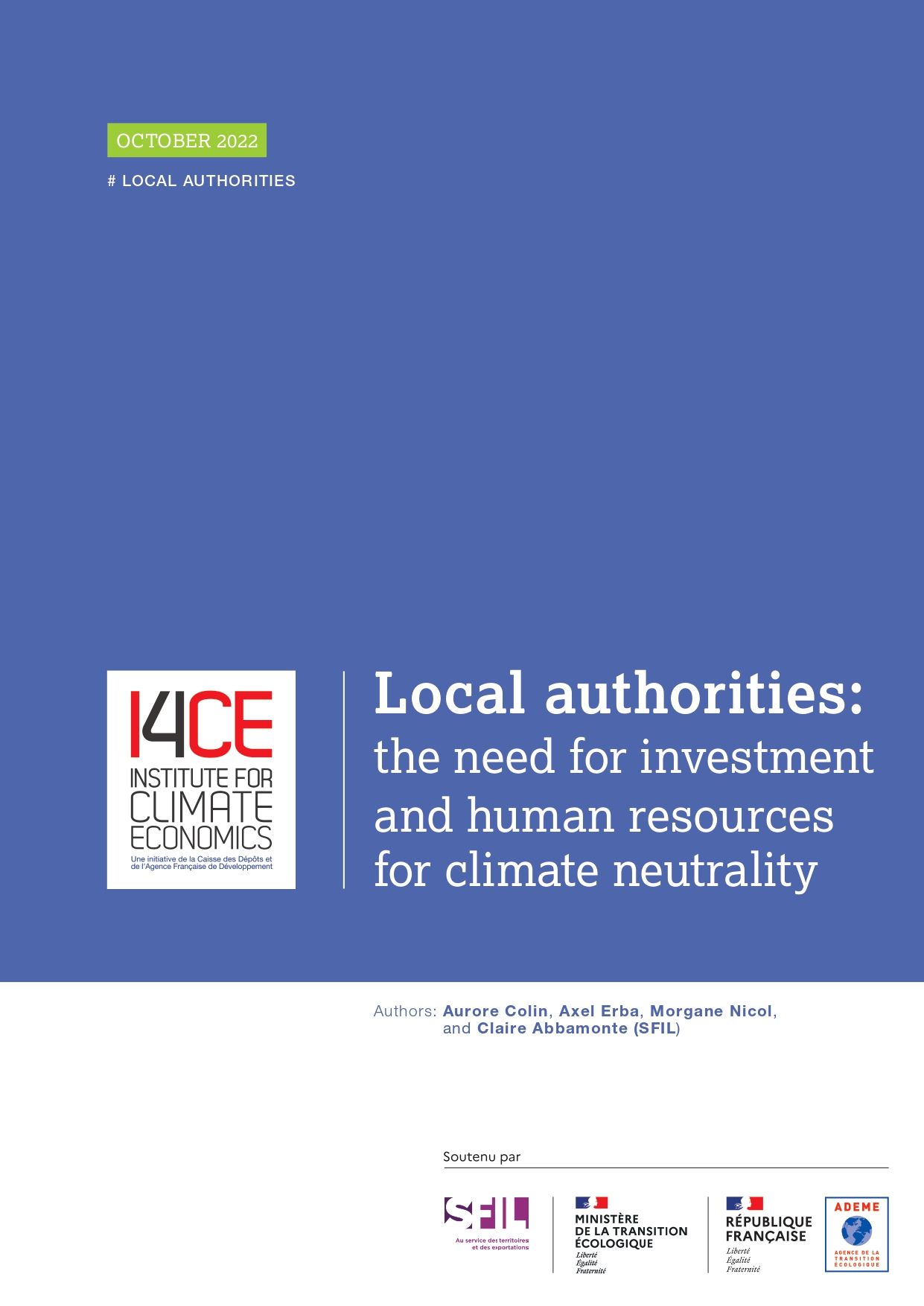Local authorities: the need for investment and human ressources for climate neutrality
Local authorities have a major role to play in achieving France’s 2050 carbon neutrality objectives, as set out in the National Low-Carbon Strategy (Stratégie Nationale Bas Carbone, SNBC). Due to their assets and areas of expertise, local authorities must make numerous climate investments, implement strategies and action plans, and take measures to encourage stakeholders within their territories. This study aims to estimate the cost of such climate action for local authorities.
Local authorities should make climate investments of at least €12 billion annually, i.e. almost 20% of their investment budget
I4CE estimates that local authorities would need to invest at least €12 billion annually until 2030 to meet the SNBC targets, which represents 18% of their current total investment budget.
These local authority climate investment needs relate to:
- Transport (67% of needs), including cycling infrastructure (€3.3bn/year) and funding for rail and urban public transport (€3bn/year);
- Energy renovation of public buildings (€2.7 billion/year);
- Energy efficiency of public lighting and local heating networks (€1.1bn/year).
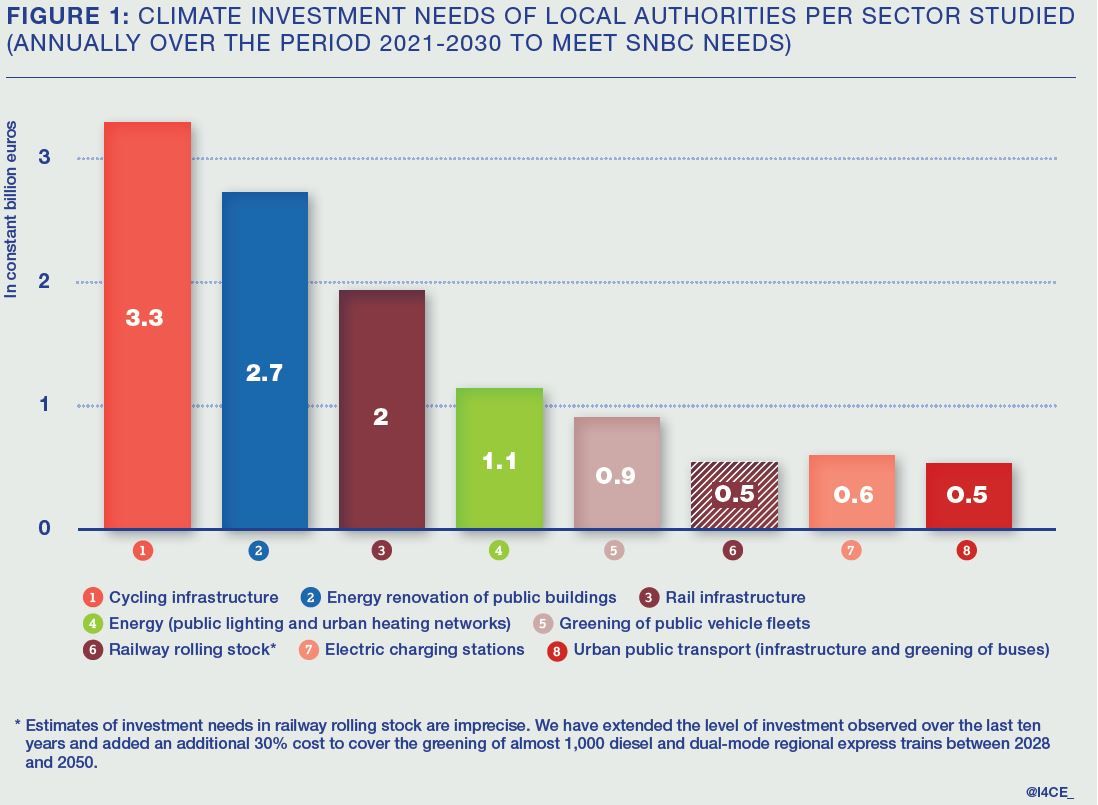
Local authorities should more than double their climate investments
I4CE estimates that local authorities currently make climate investments amounting to about €5.5 billion. Thus, from now until 2030, local authorities should make additional annual climate investments of approximately €6.5 billion. This clearly represents a significant budgetary effort. There is a particularly urgent need to accelerate investment in cycling infrastructure (+€2.3 billion/year) and in the energy renovation of public buildings (+€1.4 billion/year), but also in railways and the energy efficiency of public lighting (+€800 million/year each).
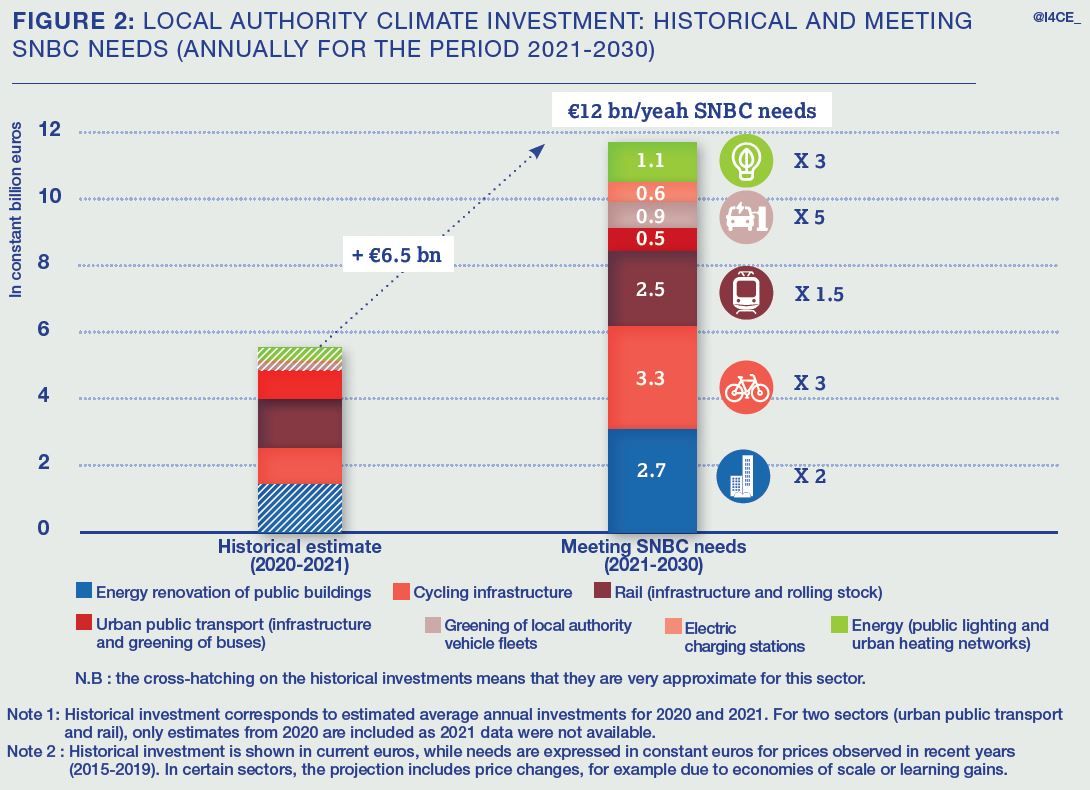
Local authorities account for 30% of the additional climate investment effort for all public and private actors combined (€22bn/year, see the “Landscape of climate finance in France” (I4CE, 2022)), compared to 10% of the total need: the investment deficit is particularly significant in sectors where local authorities play a major role (cycling, railways, etc.). Moreover, the budgetary effort required of local authorities to achieve the climate objectives is particularly high between 2021 and 2030, but should decrease thereafter if investments are made today.
Whichever scenario is chosen for the new snbc, local authority climate investment will have to increase significantly and rapidly
The National Low-Carbon Strategy (SNBC) will be revised in the coming months, particularly to account for the new EU objectives of reducing GHG emissions by 55% by 2030 (compared to a 2030 objective of a 40% reduction when the current SNBC was drawn up).
Preparations for the new SNBC provide an opportunity to reopen discussions on the guidelines for achieving carbon neutrality by 2050, for example in terms of the distribution of effort between the various sectors or the ambition in terms of energy sufficiency – i.e. reducing energy demand. Depending on the scenario adopted for the new SNBC, the investment effort expected from local authorities could vary. To illustrate these choices, ADEME has published “Transition(s) 2050” (ADEME, 2021), which presents four contrasting scenarios leading to carbon neutrality for France in 2050, for which I4CE has calculated the climate investment needs of local authorities.
Ultimately, whichever pathways are taken to achieve carbon neutrality in 2050, local authority investment will have to be significant: around €10 billion annually from now until 2030 according to the different scenarios (see Figure 3). These needs will vary according to the defined objectives in terms of transport: the greater the objectives regarding a modal shift away from cars and towards bicycles and public transport, the higher the investment needs. Local authorities can support this effort to varying extents but without their major investment, other actors will be required to make up the shortfall, with the burden falling more on households and private actors.
Objectives to reduce travel significantly would also reduce the investment needs of local authorities, as well as of households and private actors.
Accelerating climate action by local authorities requires a strengthening of their human resources: at least 25,000 dedicated staff, i.e. €1.5 billion/year
In addition to investment requirements, local authorities will also need to increase their human resources for technical assistance regarding climate and therefore their operating costs: to initiate and manage climate investments and also to organize the decarbonization dynamics of actors in their territories.
This represents a minimum of 25,000 personnel dedicated to the management of the local authority climate action that is required by 2025 to achieve the SNBC objectives. This amounts to €1.5 billion for salaries annually (see Figure 4).
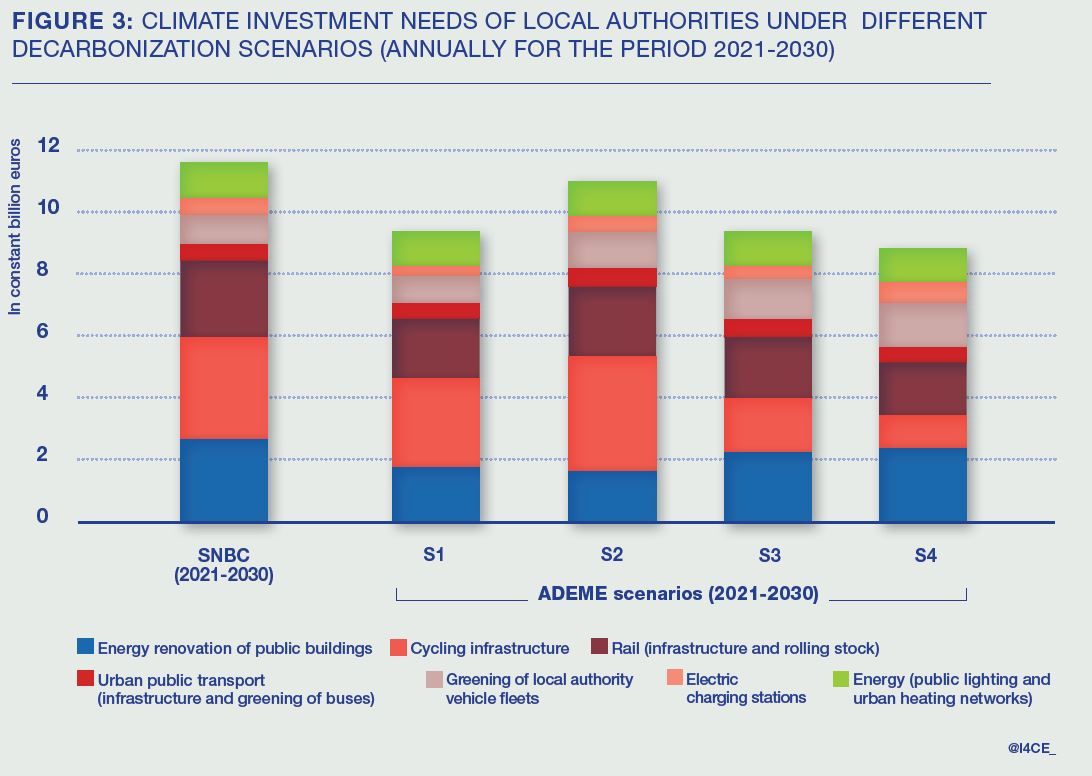
In addition to this need for staff dedicated to climate action, many positions will have to be “greened” as climate issues are integrated into sectoral policies. This is the case for technical staff, for example those responsible for building maintenance or roads, and staff responsible for steering other policies, such as those related to economic development. To achieve this objective, these staff will need to be made aware of these new issues and receive relevant training.
Even if it is not possible to calculate the number of staff currently dedicated to climate action, all feedback confirmed that local authorities, particularly the smallest, have insufficient staff and skills in relation to climate action.
It is crucial to ensure that communities have the means to implement climate action
Local authorities must therefore accelerate their climate action, both by catching up on their investments and by strengthening their human and technical assistance resources. It is crucial to ensure that they have the financial means to achieve this acceleration, in terms of both investment budget and functioning. This is particularly important because the actions of local authorities partly condition the speed of decarbonization of private actors, especially concerning transport.
